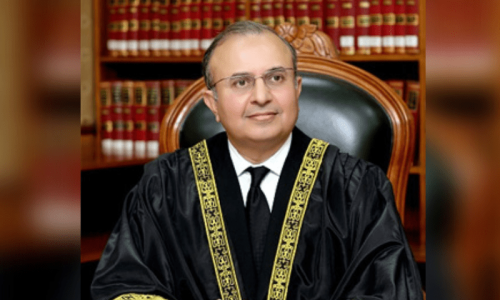
KARACHI: US diplomatic cables obtained by Dawn through WikiLeaks reveal American concerns about funds for the Taliban flowing from the United Arab Emirates to Pakistan and Afghanistan through “cash couriers.”
A cable dated September 3, 2009 from the US ambassador in Abu Dhabi states that “Taliban financing originates in and transits the UAE to Afghanistan and third countries. Cash couriers are believed to carry the majority of illicit funds to and from Afghanistan.”
It adds that the UAE should “carry out randomised searches for excessive amounts of cash, with a particular focus on flights to South Asia.”
American and Emirati officials also considered tightening the reporting requirement for cash transfers in an effort to cut off this flow.
A cable dated August 4, 2009 detailing a meeting between US Treasury Assistant Secretary David Cohen and Sultan bin Nasser al Suweidi, Governor of the Emirates’ Central Bank, reports that the governor suggested “the possibility of lowering the threshold reporting requirement for cash movement to and from Pakistan.”
He added, however, that “the government of Pakistan would likely object to Pakistani expatriates appearing to be singled out for extra scrutiny.”
Other cables also reflect increasing American frustration with wealthy Gulf states as well as with Pakistan regarding monitoring of donors allegedly funnelling cash to extremist groups in Pakistan and Afghanistan.
“While the Kingdom of Saudi Arabia takes seriously the threat of terrorism within Saudi Arabia,” says a December 30, 2009 cable sent from Washington to US missions in various Gulf capitals as well as Islamabad, “it has been an ongoing challenge to persuade Saudi officials to treat terrorist financing emanating from Saudi Arabia as a strategic priority.”
The document claims that “donors in Saudi Arabia constitute the most significant source of funding to Sunni terrorist groups worldwide. . . . more needs to be done since … Riyadh has taken only limited action to disrupt fundraising for the … Taliban and LeT groups that are also aligned with Al Qaeda and focused on undermining stability in Afghanistan and Pakistan.”
The criticism of Kuwait is similar. “While the [government of Kuwait] has demonstrated willingness to take action when attacks target Kuwait, it has been less inclined to take action against Kuwait-based financiers … plotting attacks outside of Kuwait.
“Al Qaeda and other groups continue to exploit Kuwait both as a source of funds and as a key transit point”, the cable says. It also adds that donors from the United Arab Emirates have supported Al Qaeda, the Taliban and LeT.
But of all the Gulf states, the sharpest criticism is reserved for Qatar, which, the cable says, “has adopted a largely passive approach to cooperating with the US against terrorist financing. Qatar’s overall level of CT [counter-terrorism] cooperation with the US is considered the worst in the region. Al Qaeda, the Taliban … LeT, and other terrorist groups exploit Qatar as a fundraising locale.”
Complains about the Gulf states are, however, mild compared to the scathing comments reserved for Pakistan. “Pakistan’s intermittent support to terrorist groups and militant organisations threatens to undermine regional security and endanger US national security objectives in Afghanistan and Pakistan,” the cable remarks.
“Pakistan’s extensive network of charities, NGOs and madrassas … readily provides extremist organisations with recruits, funding and infrastructure for planning new attacks.”
In fact, talking points provided to the various US missions demonstrate the different approaches suggested for Pakistan versus the Gulf states. While the tone of points to be used with Arab interlocutors is polite and almost reverential, the comments suggested for discussions with Pakistan are nearly void of traditional diplomatic niceties.
The Saudis are to be told that “[we] recognise your government’s efforts to disrupt Al Qaeda networks in the kingdom and we reaffirm our commitment to support the Saudi government in its actions on terror finance.”
The Pakistanis, however, are to be informed that the Americans “are deeply concerned that Pakistan has failed to enact an AML/CTF [anti-money laundering / combating the financing of terrorism] law” and that failure by parliament to do so is “likely to have very negative multilateral repercussions.” The said law was passed in January 2010.
According to another cable from the middle of 2009, the late American point-man for Afghanistan and Pakistan, Richard Holbrooke, asked in a meeting with Saudi interior ministry officials if they were keeping an eye on Pakistani expatriates in the kingdom.
“Holbrooke noted that Pakistan was also a centre for terrorist financing through Islamic charities and asked whether the Saudis were monitoring the large Pakistani community in Saudi Arabia, and whether the Saudis were consulting with the governments of Pakistan, India, and Bangladesh about the issue”, the cable reports.
Cables referenced: WikiLeaks # 242073, 209234, 219437, 223485








































